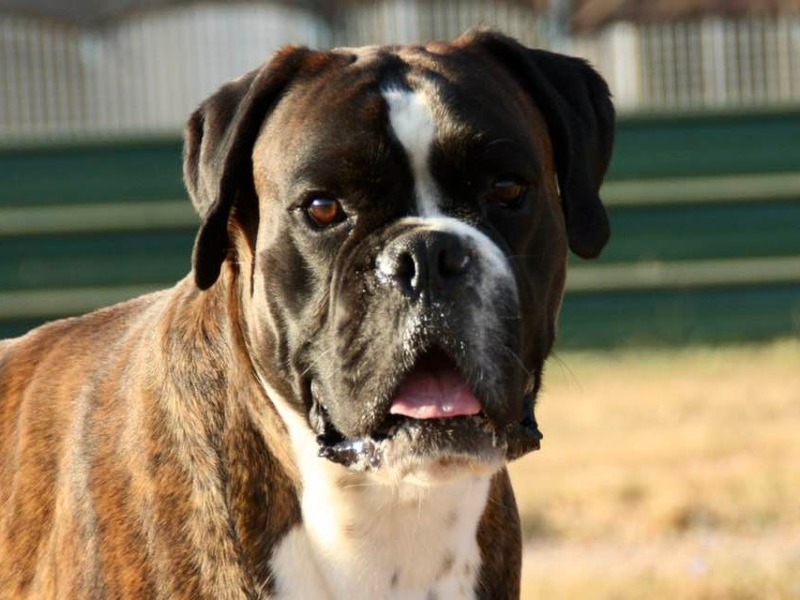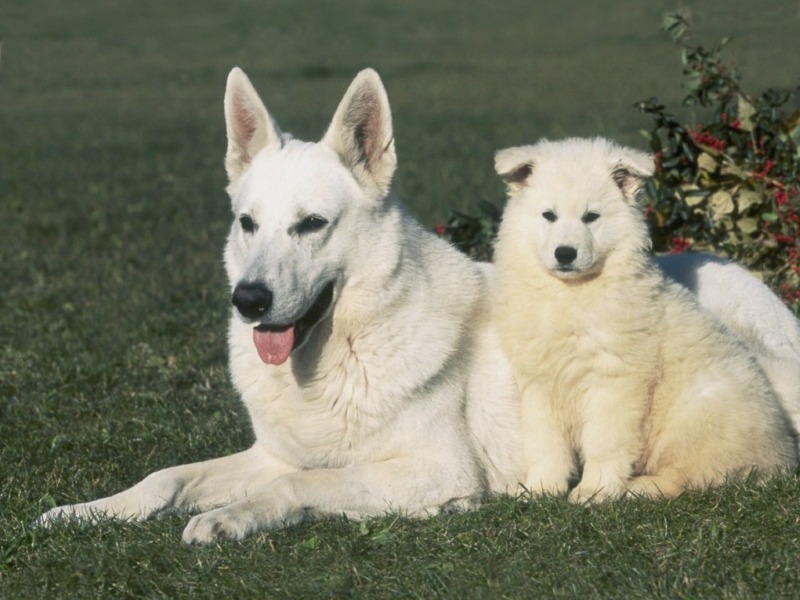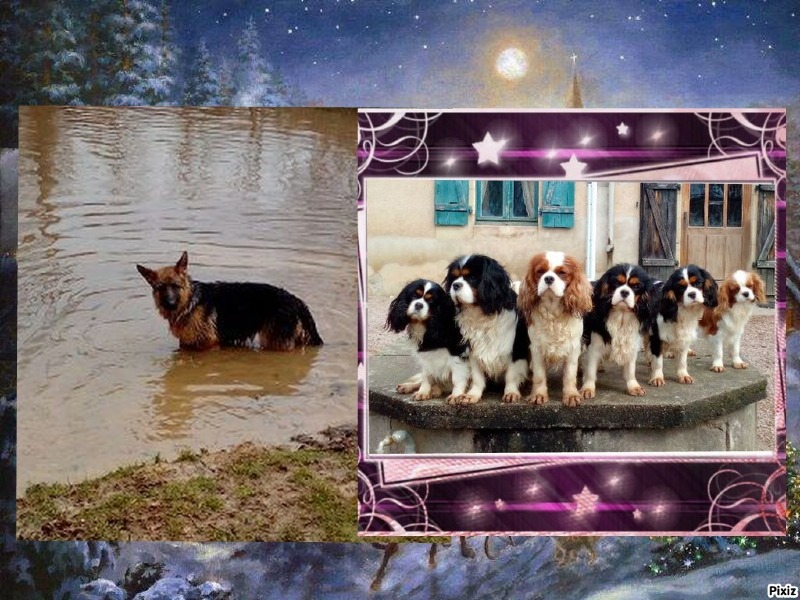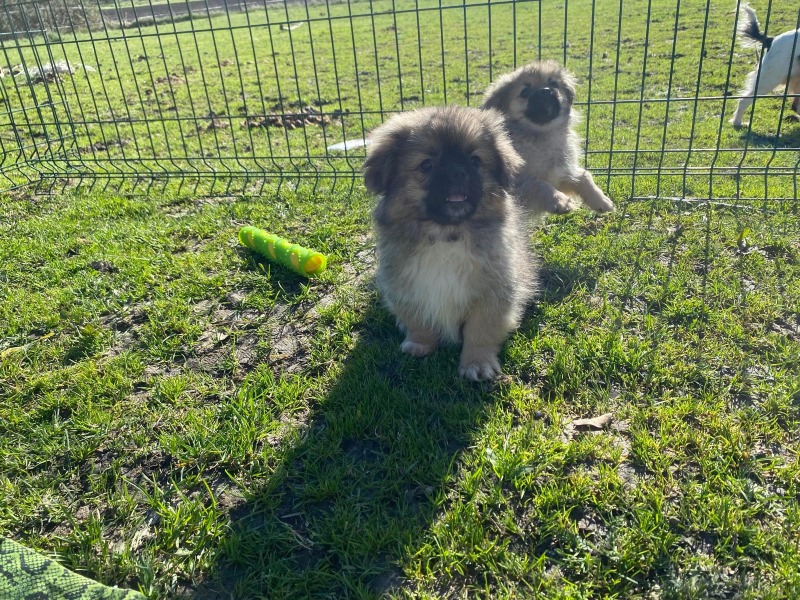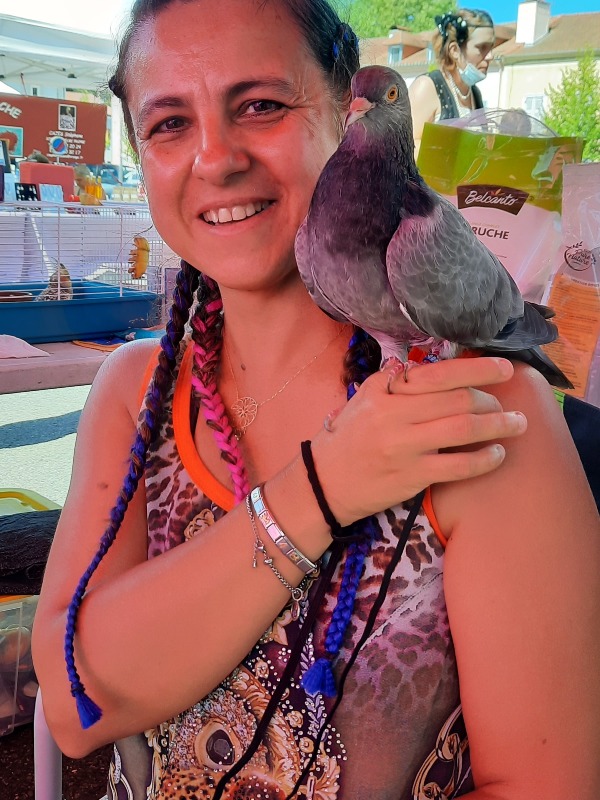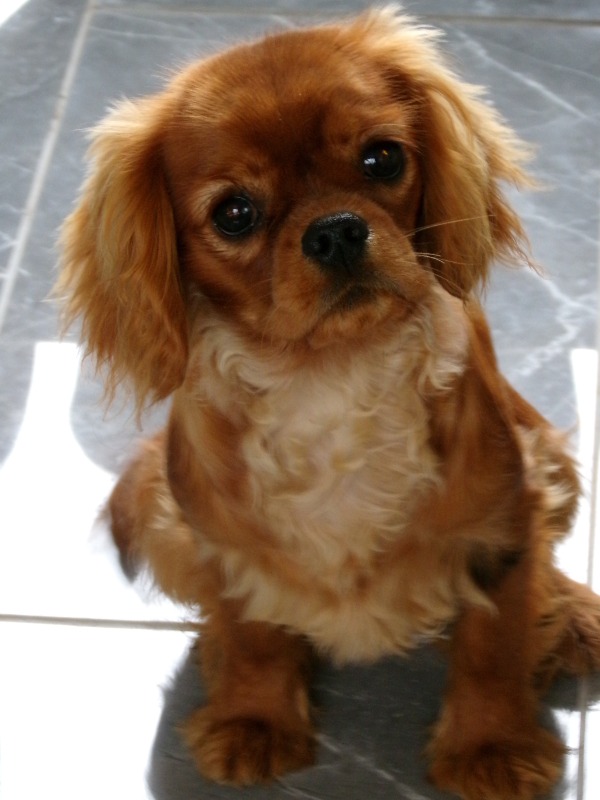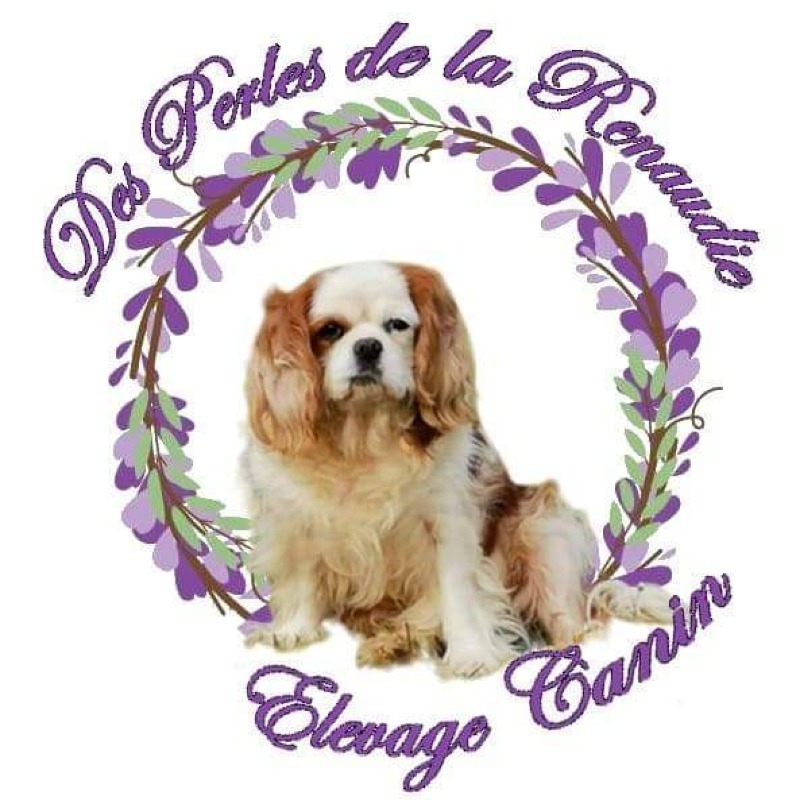Cavalier king charles spaniel
Welcome to our page dedicated to the breed of dog cavalier king charles spaniel!
Here, you will find all the useful information about cavalier king charles spaniel. This descriptive profile will allow you to discover the aspects of this breed. You can notably consult information about the average price, monthly and annual upkeep expenses, their health, name ideas, as well as their official recognition by competent authorities.
Explore this page to discover everything you need to know.
Overall description of the breed
The Cavalier King Charles Spaniel is a very old companion dog breed with ancestors that first appeared in the 16th century, notably the English Toy Spaniel. It has its origins in England where it was particularly appreciated by the British nobility, moreover, it obtained its name thanks to King Charles II who was a great admirer of the breed.
The breed is the result of several crosses of small dogs such as the Cavalier King Charles, the Pug or the Pekingese. The selection work was mainly done in the 19th century. The first dedicated club and official standard was established in Great Britain in 1928, and the English Kennel Club registered the breed for the first time almost two decades later, in 1945.
The International Cynological Federation registered it definitively on 20 January 1955, the last update of the official standard in force was published on 4 November 2008.
The Cavalier King Charles Spaniel is a small, elegant, well-proportioned dog with a graceful gait and a gentle walk. The body is of medium length, rectangular in shape, with slightly arched loins, straight back and broad trunk with a sternal line running down to the elbows.
The tail is carried straight in line with the topline, of medium length and set high. The size of the head is in keeping with the rest of the body, associated with a skull discreetly domed at the front, but almost flat between the ears and a slightly accentuated stop.
The ears are long, drooping along the neck, with abundant feathering evenly distributed over the body. The Cavalier King Charles Spaniel's coat is long, dense and glossy, with a slight waviness permitted by the standard. The coat colours conforming to the breed are black and tan, blenheim, ruby, bicolour or tricolour.
This small British Spaniel has a rather calm character, very affectionate towards its owners and docile, it is a remarkable companion, especially for the elderly, with whom it gets along wonderfully. Of a jovial nature, it needs the presence of man to feel completely fulfilled and thus supports with difficulty the moments of solitude. It is a dynamic animal that is very fond of family games as well as affection from its loved ones, and its benevolent temperament is also suitable for children, whom it will protect with great care.
Sociable and welcoming, he shows no aggression with strangers and is not fearful, his natural confidence in humans will lead him to make contact with them in complete confidence. Reserved and sometimes shy, he will remain calm in his corner when the situation requires it, but will always follow his masters with his eyes. In short, this is a peaceful, well-balanced companion who is very attached to his family circle, the perfect little companion dog that will gladly accompany you in your daily life, winning the hearts of adults and children alike.
Adult: The Cavalier King Charles Spaniel will weigh approximately 5.5 to 8 kg (12 to 17.5 lbs) and his withers height will be approximately 25 to 34 cm (10" to 13.5").
Awareness of acquiring an animal
Each animal is a sensitive being, deserving love, attention and care.
When you choose to adopt an animal, you take on the responsibility of ensuring its health and well-being throughout its life.
To learn more about animal welfare, we invite you to consult our FAQ by clicking the button below:
Origins
The Cavalier King Charles Spaniel has its origins in England and descends from small court spaniels that were popular at the British royal court in the 16th and 17th centuries. They were particularly appreciated by King Charles II, who gave them their name. The ancestors of this breed were also present in the artworks and portraits of the time, illustrating their privileged place among the nobility. Initially bred to be companion dogs, they have always been appreciated for their small size, beauty, and gentle temperament. Today, the Cavalier King Charles Spaniel is loved worldwide for its charm and affectionate nature.
History
The history of the Cavalier King Charles Spaniel dates back to the 16th century, when its ancestors, the small court spaniels, were highly prized at the English court. King Charles II was particularly fond of them, leading to the breed being named in his honor. Over the centuries, these small dogs continued to be popular among the aristocracy. However, by the end of the 19th century, crossbreeding with Asian breeds such as the Pug had altered the appearance of these dogs. In the 1920s, enthusiasts set out to restore the breed's original appearance, as it was in the time of Charles II. The Cavalier King Charles Spaniel was officially recognized by the British Kennel Club in 1945.
Standard
The standard of the Cavalier King Charles Spaniel breed, as defined by the Fédération Cynologique Internationale (FCI) and the Kennel Club of Great Britain, describes a small, elegant and well-proportioned dog. The head is slightly domed, with large, round and expressive dark eyes. The ears are long, well set and drooping, covered with long, silky hair. The muzzle is conical with a pronounced stop. The body is compact and harmonious, with a moderately deep chest and well sprung ribs. The legs are straight and well muscled, and the tail is carried cheerfully in action, but never above the back. The coat is long, silky and without curls, with a slight wave accepted. Coat colors include black and tan, tricolor, blenheim (red and white) and ruby (solid red).
Physical characteristics
The Cavalier King Charles Spaniel is a graceful and well-proportioned small dog, measuring between 30 and 33 cm at the withers and weighing between 5.4 and 8 kg. Its body is compact and elegant, with a moderately deep chest and well-arched ribs. The head is slightly domed with a conical muzzle and a pronounced stop. The eyes are large, round, and dark in color, expressing sweetness and affection. The ears are long, well-set and drooping, covered with long and silky hair. The coat is long, silky and free of curls, with a slight wave accepted. Coat colors include black and tan, tricolor, blenheim (red and white) and ruby (solid red). The tail is carried happily in action, but never above the back.
Character
The Cavalier King Charles Spaniel is known for its gentle, affectionate and sociable nature. It is an extremely devoted dog to its family, loving to be the center of attention and participate in all family activities. Its cheerful and friendly temperament makes it an excellent companion for both children and adults. The Cavalier King Charles Spaniel is also very intelligent and curious, making it easy to train. It is known to get along well with other pets and strangers, making it an ideal companion dog. Despite its small size, it is sturdy and enjoys outdoor activities, but also appreciates relaxing moments on its owners' laps.
Life expectancy
The Cavalier King Charles Spaniel has an average life expectancy of 12 to 15 years. This longevity can be achieved through a balanced diet, regular veterinary care, and appropriate physical activity. However, the breed is prone to certain genetic conditions such as mitral valve disease, syringomyelia, and patellar luxation. Regular veterinary follow-up allows for early detection and treatment of these conditions, thus contributing to a long and healthy life for the dog. By providing a healthy lifestyle, quality nutrition, and lots of love and attention, owners can ensure that their Cavalier King Charles Spaniel fully enjoys its years, healthy and happy.
Exercise and activity needs
The Cavalier King Charles Spaniel, although small and often considered a lap dog, needs regular exercise to stay healthy and happy. He enjoys daily walks, interactive games, and free-running moments in a secure space. On average, one to two hours of activity per day is sufficient to meet his exercise needs. Due to his intelligence and desire to please, he also enjoys mentally stimulating activities such as obedience training and puzzle games. Regular exercise helps prevent boredom and destructive behaviors, ensuring a well-balanced and content dog. The Cavalier King Charles Spaniel thrives in an environment where he can be active and engaged with his family.
Recommended diet
The diet of the Cavalier King Charles Spaniel must be balanced and adapted to its specific needs. On average, an adult Cavalier King Charles Spaniel consumes between 100 and 150 grams of dry food per day, divided into two meals. It is crucial to choose high-quality food, rich in proteins and essential nutrients, to maintain its health. specially formulated kibbles for small breeds are often recommended. The monthly cost of food for a Cavalier King Charles Spaniel generally varies between 20 and 40 euros, depending on the quality of the products chosen. It is important to monitor its weight and avoid overeating, as Cavaliers can be prone to obesity. Healthy treats can be used in moderation for training and as rewards.
Training and obedience
The Cavalier King Charles Spaniel is an intelligent and receptive breed, which greatly facilitates its training and education. He learns quickly and enjoys challenges, making him an ideal student for various types of training. Positive reinforcement methods, such as treats and praise, are particularly effective with this breed. Consistency and patience are essential, as although he is receptive, he can sometimes be a bit stubborn. Basic commands like "sit," "come," "heel," and "stay" should be taught from the start. Early socialization with other dogs and varied environments helps prevent undesirable behaviors and develop a well-balanced dog. The Cavalier King Charles Spaniel also responds well to agility and obedience activities.
Behavior with children
The Cavalier King Charles Spaniel is often considered an excellent companion for children due to its gentle, playful, and patient temperament. He loves to participate in children's games and is generally very tolerant of their sometimes clumsy ways. His small size and gentle nature make him an ideal choice for families. However, it is important to supervise interactions between the Cavalier King Charles Spaniel and young children to avoid unintentional accidents and ensure that the dog is treated with respect. Teaching children to handle the dog gently and respect his needs is essential for harmonious coexistence. With proper socialization, the Cavalier King Charles Spaniel can become a loyal and loving companion for children of all ages.
Compatibility with Other Animals
The Cavalier King Charles Spaniel is generally very sociable and gets along well with other pets, including dogs and cats. Its friendly nature and lack of hunting instinct make it an excellent companion for households with multiple animals. Socializing the Cavalier King Charles Spaniel from a young age is important to allow it to become accustomed to the presence of other animals. Introductions should be gradual and supervised to ensure a harmonious cohabitation. Due to its small size and gentle temperament, the Cavalier King Charles Spaniel is not aggressive and is often curious and playful with its four-legged companions. Positive socialization from the beginning helps strengthen the relationships between the Cavalier King Charles Spaniel and other animals in the household.
Grooming needs
The Cavalier King Charles Spaniel has a long, silky coat with no curls, slight waves are allowed, which requires regular maintenance to remain in good condition. Daily brushing is recommended to prevent knots and tangles and to maintain the shine of its coat. The long, floppy ears should be checked and cleaned regularly to prevent infections. Baths are only necessary occasionally, or when the dog is particularly dirty, using a mild shampoo suitable for dogs. Teeth should be brushed frequently to prevent dental problems, and nails should be trimmed regularly to prevent injury. Regular grooming helps to quickly detect skin problems or other abnormalities, thus contributing to the overall health and well-being of the Cavalier King Charles Spaniel.
Health
The Cavalier King Charles Spaniel is generally a healthy breed, but is prone to certain hereditary health conditions. Common health problems include mitral valve disease, syringomyelia, patellar luxation, and certain eye conditions. It is crucial to choose a reputable breeder who tests their dogs for these conditions to minimize risks. A balanced diet, regular exercise, and periodic veterinary visits are essential to maintain their health. Cavaliers can also be prone to obesity, requiring special attention to their diet and exercise levels. Regular veterinary check-ups help detect and treat these conditions quickly, contributing to a long and healthy life for the dog.
Average price
The price of a Cavalier King Charles Spaniel can vary considerably depending on several factors, such as lineage, pedigree, breeder reputation, and geographical location. In general, the average price for a Cavalier King Charles Spaniel puppy is between 1,000 and 2,000 euros. Specimens from champion lines or with exceptional characteristics can cost much more, sometimes up to 3,000 euros or more. It is essential to choose a reputable breeder who adheres to health and animal welfare standards. Although this may mean paying a higher price, it often guarantees a healthy and well-socialized puppy. Prospective owners should also budget for additional expenses for veterinary care, food, accessories, and training.
Expenses
Monthly expenses for a Cavalier King Charles Spaniel can vary depending on several factors, including food, veterinary care, grooming, and accessories. On average, owners can expect to spend between 50 and 100 euros per month. High-quality food, tailored to the specific needs of the breed, costs around 20 to 40 euros per month. Regular veterinary care, including vaccinations and parasite treatments, can add 10 to 20 euros per month. Grooming, although minimal, can cost 10 to 20 euros per month if done by a professional. Toys, treats, and other accessories can add an additional 10 to 20 euros. These costs may vary depending on the specific needs of each dog and the owner's choices.
Name ideas
Choosing a name for your Cavalier King Charles Spaniel can be a fun and exciting task. Here are some name suggestions that could suit the charming personality and appearance of this breed: Max, Luna, Rocky, Bella, Zeus, Daisy, Charlie, Maya, Rex, Ruby, Thor, Nala, Bruno, Athena, Oscar, Zara, Milo, Sadie, Ginger, Toby. When choosing a name, it is important to consider its pronunciation and ensure that it does not sound too similar to basic commands to avoid any confusion during training. Take the time to observe your dog and choose a name that reflects their unique personality and adorable appearance.
Legislation and regulation
In France, the Cavalier King Charles Spaniel is not among the dog breeds categorized as dangerous and is therefore not subject to specific restrictions. Owners must however comply with general regulations regarding canine ownership, including microchipping or tattooing identification, and up-to-date vaccination. It is also recommended to take out civil liability insurance to cover any potential damage caused by their dog. When traveling abroad, it is crucial to check the specific requirements of the destination country regarding health certificates and vaccinations. Always inquire about local and national laws to avoid any legal issues and ensure a harmonious cohabitation with the Cavalier King Charles Spaniel.
Official recognition
The Cavalier King Charles Spaniel is recognized by several cynological organizations around the world. In France, it is recognized by the Société Centrale Canine (SCC). Internationally, it is recognized by the Fédération Cynologique Internationale (FCI), the American Kennel Club (AKC) in the United States, and the Kennel Club (KC) in the United Kingdom. These organizations define the standards of the breed and organize dog shows where Cavalier King Charles Spaniels can be presented and evaluated. Recognition by these organizations also ensures that breeders adhere to health, temperament, and conformation standards, contributing to the preservation and improvement of the breed. Pedigrees issued by these organizations guarantee the purity and quality of the bloodlines.
Pedigrees
Cavalier King Charles Spaniels can obtain pedigrees recognized by various breed clubs around the world, ensuring their pure lineage and conformity to breed standards. In France, the Société Centrale Canine (SCC) issues pedigrees. In the United States, the American Kennel Club (AKC) offers pedigrees for Cavalier King Charles Spaniels. In the United Kingdom, the Kennel Club (KC) also issues pedigrees for this breed. Other organizations like the Fédération Cynologique Internationale (FCI) recognize and issue pedigrees for Cavalier King Charles Spaniels. These organizations verify the dogs' origins and certify that they meet breed criteria, ensuring the quality and purity of the lines.
Destination and usage
The Cavalier King Charles Spaniel is primarily bred as a companion dog because of its sweet, affectionate, and playful temperament. Its small size and adaptable nature make it an ideal choice for families living in apartments or houses. In addition to being an excellent companion, the Cavalier King Charles Spaniel often participates in dog shows, where it is appreciated for its beauty and adherence to breed standards. Some Cavalier King Charles Spaniels are also used as therapy dogs, providing comfort and joy to people in hospitals, nursing homes, and schools. Thanks to its sociable and loving nature, the Cavalier King Charles Spaniel excels in social interactions and can bring a lot of happiness to those around it.
Prohibitions
In France, the Cavalier King Charles Spaniel is not part of dog breeds subject to specific bans or classified as dangerous. However, it is essential to comply with general regulations regarding dog ownership, including identification, vaccination, and adherence to local laws concerning pets. In some countries, regulations may vary. For example, some countries may have specific requirements regarding the importation of dogs, including health certificates and quarantines. It is always important to inquire about local and national laws, especially when traveling or moving, to avoid any violations and ensure a harmonious and legal cohabitation with your Cavalier King Charles Spaniel.
Breeders of Cavalier king charles spaniel
Want to see more breeders of Cavalier king charles spaniel?
Check out the page of our directory listing all breeders of Cavalier king charles spanielClassified Ads of cavalier king charles spaniel
No of cavalier king charles spaniel classified ads are available on Preeders.
If you’re a breeder, sign up for free now and be the first to post a classified ad
Breed clubs of cavalier king charles spaniel
No of cavalier king charles spaniel breed clubs are currently registered on Preeders.
If you would like to highlight your breed club, sign up for free now and be the first to appear on this page.

